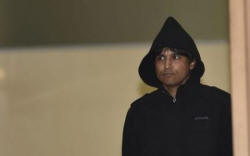|
 Accused
U.S. 'flash crash' trader fails to have UK extradition case postponed Accused
U.S. 'flash crash' trader fails to have UK extradition case postponed
 Send a link to a friend
Send a link to a friend
[August 28, 2015]
LONDON (Reuters) - A London-based
day-trader accused by the United States of market manipulation that
contributed to the Wall Street "flash crash" in 2010, failed to persuade
a court on Friday to postpone his extradition hearing.
|
|
 Navinder Sarao, who lives with his parents in a small house near
London's Heathrow Airport, was arrested by British police on a U.S.
extradition warrant in April after being charged with wire fraud,
commodities fraud and market manipulation by the U.S. Justice
Department. Navinder Sarao, who lives with his parents in a small house near
London's Heathrow Airport, was arrested by British police on a U.S.
extradition warrant in April after being charged with wire fraud,
commodities fraud and market manipulation by the U.S. Justice
Department.
He was freed on bail on Aug. 14 after spending four months in
prison.
On Friday , his defense lawyer James Lewis told Westminster
Magistrates Court he needed more time to obtain expert evidence
about trading and how the market worked to help address the issue of
whether Sarao had made false representations through his trading
activity.

But District Judge Quentin Purdy rejected the application, saying he
did not think expert evidence would be relevant to what he had to
decide - which was not the facts of the case but rather whether the
U.S. charges would also be offences under English law.
The full extradition hearing remained set for Sept. 25.
The flash crash saw the Dow Jones Industrial Average briefly plunge
more than 1,000 points on May 6, 2010, temporarily wiping out nearly
$1 trillion in market value.
[to top of second column] |

Sarao, 36, is accused of using an automated program to "spoof"
markets by generating large sell orders that pushed down prices. He
then canceled those trades and bought the contracts at the lower
prices, reaping a roughly $40 million profit on his trading, U.S.
authorities allege.
He has denied wrongdoing, telling the Westminster court in May:
"I've not done anything wrong apart from being good at my job."
(Reporting by Estelle Shirbon; editing by Stephen Addison)
[© 2015 Thomson Reuters. All rights
reserved.]
Copyright 2015 Reuters. All rights reserved. This material may not be published,
broadcast, rewritten or redistributed.
 |